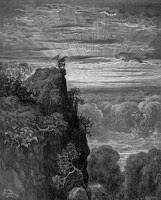 Anyone who doubts just how dormant poetry currently is as an art-form need only read Andrew Motion’s enthusiastic review in this weekend's Guardian of Anna Beer’s new biography of John Milton – Milton's 400th anniversary is this year – to have their worst fears confirmed. Motion is the current British poet laureate, but from reading this one begins to wonder just what sort of poems he writes himself. And then one discovers Motion's poem celebrating the marriage of Prince Charles and Camilla Parker-Bowles, and all hope is forever lost.
Anyone who doubts just how dormant poetry currently is as an art-form need only read Andrew Motion’s enthusiastic review in this weekend's Guardian of Anna Beer’s new biography of John Milton – Milton's 400th anniversary is this year – to have their worst fears confirmed. Motion is the current British poet laureate, but from reading this one begins to wonder just what sort of poems he writes himself. And then one discovers Motion's poem celebrating the marriage of Prince Charles and Camilla Parker-Bowles, and all hope is forever lost.Milton’s reputation ebbs and flows with the times – Robert Graves despised him, TS Eliot thought he was great – but An Spailpín Fánach is inclined to take his judgement from George Bernard Shaw. “English,” Shaw has Professor Higgins declaim in Pygmalion, “is the language of Milton, Shakespeare and the Bible.” Good enough for GBS, good enough for An Spailpín Fánach.
Motion seems less convinced. The first thing Motion does is make sure there’s some clear blue water between himself and Milton. Motion holds his nose while telling us that Milton was “a man whose views on the role of women seem to contaminate much that is central to his work and existence.”
Milton was also a enthusiastic supporter of the Lord Protector, Oliver Cromwell, as enthusiastic a supporter of genocide as has visited these shores, and the Green Isle of Erin has been visited by a few of them. Should we hold this against him, as well as his views on women? Should a man living three hundred years before women were granted suffrage presage his age? It’s a lot to ask, isn’t it?
Motion remarks that it’s difficult for Ms Beer to make “Milton at home likeable, or even vivid.” Is she writing a biography, or an episode of the Waltons? One of the countless evils of the culture wars is that political correctness insists that poets must be acceptable guests at a dinner party in Sandymount if they were alive today, thus wiping out more or less the entire canon of Western literature. Of course Milton was a tricky customer – how could he not be? But he also wrote what is possibly the most heart-breaking poem of loss in the language, Methought I Saw My Late Espousèd Saint, so he can’t have been all bad.
And he wrote Paradise Lost, the towering poetic achievement of the English language, the only epic in the language, the poem by which all others measure themselves and are found wanting. Motion tips the cap to this idea – “its peerless combinations of imaginative reach and political analysis, its profoundly subtle enquiries into the nature of our relationship with the divine, its marvellous organ-blast hymn to (and the plea for vigilant support of) liberty” – but one gets the sense his heart isn’t quite in it. Diane Purkiss, in her review in the Telegraph, gets it so much better: “it's not a difficult poem; it's easier than most of Shakespeare. Its sonorous organ tones and phalanxes of angels are the brilliant backdrop to intense moral debates between charismatic tempter and naive humanity.”
The reason for the distance between Milton and his twenty-first century readership is best summed up by John Carey, in his review of the Beer biography in the Sunday Times at the weekend: “Milton’s art is rooted in Greek and Latin literature and in Christian theology, and the vast majority of the British people are ignorant of all three.”
Professor Carey hated Ms Beer’s book, and stomps all over it in his review. It is the stomping of a love spurned, as it’s very clear that Professor Carey dearly loves the poem, and hates to see it not recognised for the supreme achievement that it is. Professor Carey’s hypothesis, about the role that Milton’s subconscious played in the writing of the poem, is especially fascinating to those who are captivated by the poem’s great contradiction – why it is that a poem whose avowed purpose is to “justify the ways of God to man” paints Satan in such an heroic light?
An Spailpín’s advice is to ignore Ms Beer’s advice entirely, and head straight for Paradise Lost itself. Don’t attempt to consume it neat, because you won’t get it. The references will be too arcane. But if you can get a good annotated edition, you are in for treat that will stay with you for the rest of your life. And remember also that this is an epic poem – things happen on the grand scale. But do make the effort – it’s the New Year, and you owe yourself a treat.
Technorati Tags: culture, books, poetry, John Milton, Paradise Lost
